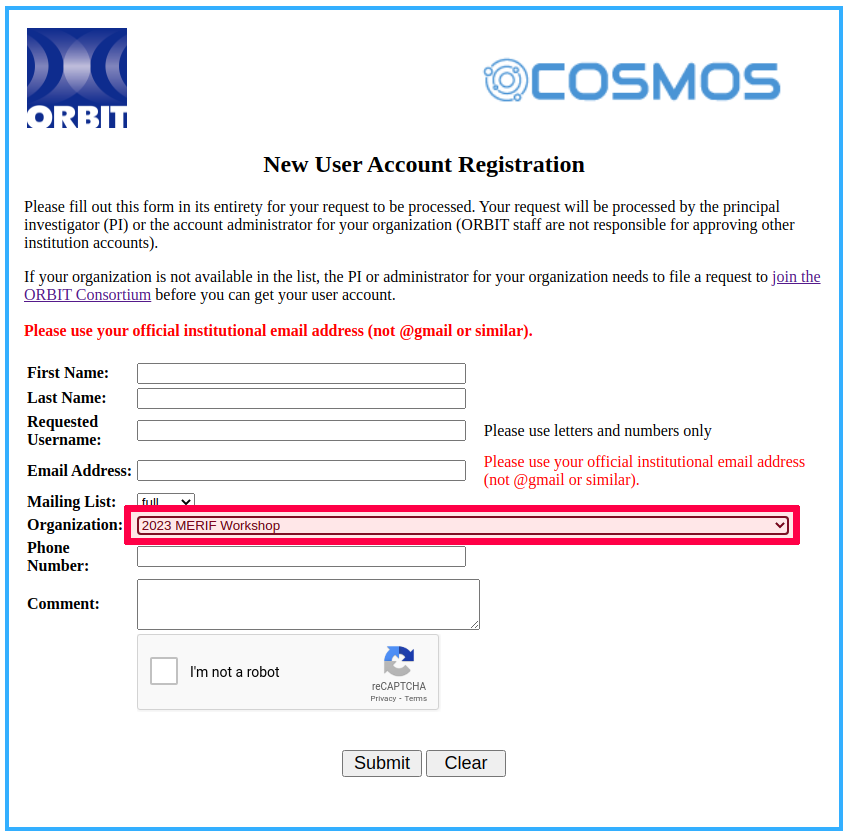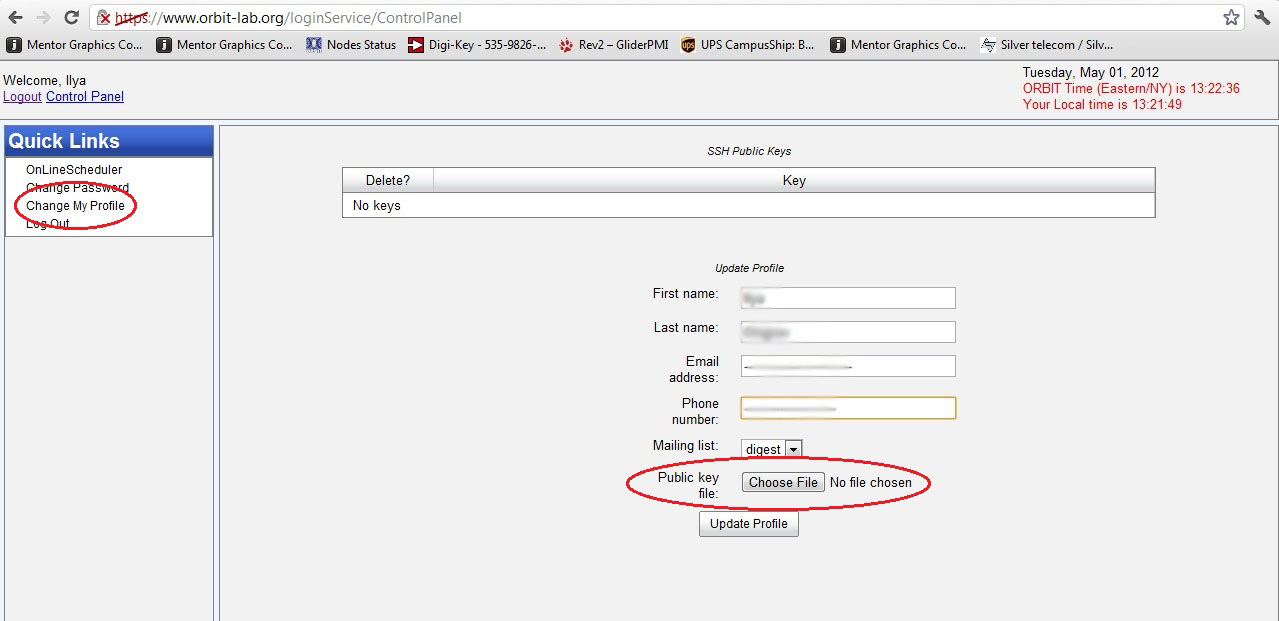Site Navigation
MERIF 2023 Cosmos Testbed Tutorial
Signup Instructions
Prerequisites
If you are registered for the tutorial session and you are planning to participate in the live demos, please follow these instructions prior to the session. We may not be able to provide prompt assistance with account creation during the session.
Create an Orbit Account
- Register for a Cosmos/Orbit account here: https://www.orbit-lab.org/userManagement/register. For your organization, please select "2023 MERIF Workshop" from the drop-down menu as shown:
- Look for a verification email with a link. After clicking the verification link, your account will be submitted to COSMOS administrators for approval. Account approval is not immediate, so please try to do this in advance of the tutorial. Please note that your account may not be approved until the day of the tutorial.
Set up SSH keys
NOTE: You can set up your ssh keys even if you have not yet received confirmation of your orbit account.
Access to the Cosmos testbed is typically through SSH, which requires the use of public key authentication. You will need to generate a public-private pair of keys and upload them to the account management page so that you can use your keys to log into Cosmos machines. You will also need to verify that you have an SSH client available on your personal machine.
Linux
NOTE: These instructions are NOT for Ubuntu running on Windows using Windows Subsystem for Linux (WSL).
These instructions assume you will be using a standard command-line SSH client for linux. If you have not already done so, ensure that you have it installed by running the following commands in a command-line terminal:
sudo apt-get update sudo apt-get install openssh-client
Generating keys
Each distribution has their own location for the specific generation tools. These instructions are based on the documentation for Ubuntu (located here).
To create your public and private SSH keys, open a command-line terminal and type:
ssh-keygen -t rsaYou will be prompted for a location to save the keys, and a passphrase for the keys which we highly recommend using. This passphrase does not have to be the same as your COSMOS account password.
Generating public/private rsa key pair. Enter file in which to save the key (...): Enter passphrase (empty for no passphrase): Enter same passphrase again: Your identification has been saved in ... Your public key has been saved in ... Your public key is now available as .ssh/id_rsa.pub in your home folder.
This process will generate and store a private key and a public key file. The private key will be stored in the file and location you specify when prompted, and the public key file will be named the same as your private key file but with a .pub extension.
Uploading your public key to your COSMOS account
To upload you public key to your cosmos account, do the following:
- Go to Profile and sign in with your COSMOS username and password
- Click on "Change My Profile" option in the left side menu
- Click the "Choose File" button next to "Public key file"
- Navigate to where your public key file is stored (typically /home/your_username/.ssh)
- Select the .pub file corresponding to the key you wish to use for COSMOS access
- Click "Open"
- Click the "Update Profile" button
As a side note, expect to see a default auto generated public key in the list (ends with @internal1). This is used for SSH access between machines inside the COSMOS network. Please do NOT delete this key.
Configuring your SSH client
Under normal circumstances, as long as the private key file is located in the /home/your_username/.ssh/ folder, the command line SSH client will use the correct key when connecting.
To test your setup, open a command-line terminal and (replacing your_cosmos_username with your own COSMOS username) type:
ssh your_cosmos_username@gw.orbit-lab.orgYou should be prompted to enter your key file passphrase and be able to successfully connect.
Type
exitand press the Enter key to end the SSH session.
Common issues and how to solve them
- If you receive a message like the following:
This is a normal message that occurs when your computer connects via SSH to another that it has never connected to before or if the "fingerprint" of the other machine changed (due to replacement or reconfiguration). Simply type
The authenticity of host 'gw.orbit-lab.org (128.6.192.134)' can't be established. ECDSA key fingerprint is SHA256:iLKtq2Z8wB3ADJdEyM1CwoU85gOeqIUyB4GOJ2YloQg. Are you sure you want to continue connecting (yes/no)?
yesand connection will proceed normally.
- If you receive a message like the following:
Try connecting again but manually specifying the location where your private SSH key is stored as in the following example:
Permission denied (publickey).ssh -i /path/to/your/private_key your_cosmos_username@gw.orbit-lab.org
Windows
Install OpenSSH client on your Computer
These instructions assume that you are using a currently supported version of Windows 10 and Windows 11. If you are using an older version of windows, please follow the instructions on this page: https://wiki.cosmos-lab.org/wiki/GettingStarted#no3.
- Go to Settings—>Apps—>Optional Features] in Windows Settings.
- If "OpenSSH Client" is listed under the Installed features, you are all set and can go to the next step.
- If "OpenSSH Client" is not listed under the Installed features, click on the View features button right next to the Add an optional feature text.
- In the Search bar on top of the Add an optional feature, type in "OpenSSH Client", and click on the checkbox next to it, and click next.
- Review details of what will be installed and click Install.
- Wait for it to be installed, you might need to restart your PC according to what it says in Settings.
Generating keys
- Open Powershell in Windows as Admin.
The following steps ensure that your key is saved in the right location
- Type in
cd C:\Users
- Type in
ls
to see what is your user name
- Type in
cd <your Username>
- Type in
cd .ssh
(if this folder doesn't exist then create it)
- type in
ssh-keygen -t rsa
You will be prompted for a location to save the keys, and a passphrase for the keys which we highly recommend using. This passphrase does not have to be the same as your ORBIT account password.Generating public/private rsa key pair. Enter file in which to save the key (...): Enter passphrase (empty for no passphrase): Enter same passphrase again: Your identification has been saved in ... Your public key has been saved in ... The key fingerprint is: SHA256:... The key's randomart image is: ...
Uploading your public key to your ORBIT account
To upload you public key to your orbit account, do the following:
- Go to https://www.orbit-lab.org/cPanel/controlPanel/start and sign in with your ORBIT username and password
- Click on "Change My Profile" option in the left side menu
- Click the "Choose File" button next to "Public key file"
- Navigate to where your public key file is stored (typically C:\Users\your_username\.ssh)
- Select the .pub file corresponding to the key you wish to use for ORBIT access
- Click "Open"
- Click the "Update Profile" button
As a side note, expect to see a default auto generated public key in the list (ends with @internal1). This is used for SSH access between machines inside the ORBIT network. Please do NOT delete this key.
Configuring your SSH client
Under normal circumstances, as long as the private key file is located in the C:\Users\your_username\.ssh\ folder, the command line SSH client will use the correct key when connecting.
To test your setup, open Powershell and (replacing your_orbit_username with your own ORBIT username) type:
ssh your_orbit_username@gw.orbit-lab.orgYou should be prompted to enter your key file passphrase and be able to successfully connect.
Type
exitand press the Enter key to end the SSH session.
Common issues and how to solve them
- If you receive a message like the following:
The authenticity of host 'gw.orbit-lab.org (128.6.192.134)' can't be established. ECDSA key fingerprint is SHA256:iLKtq2Z8wB3ADJdEyM1CwoU85gOeqIUyB4GOJ2YloQg. Are you sure you want to continue connecting (yes/no)?
This is a normal message that occurs when your computer connects via SSH to another that it has never connected to before or if the "fingerprint" of the other machine changed (due to replacement or reconfiguration). Simply typeyesand connection will proceed normally.
- If you receive a message like the following:
Permission denied (publickey).
Try connecting again but manually specifying the location where your private SSH key is stored as in the following example:ssh -i /path/to/your/private_key your_orbit_username@gw.orbit-lab.org
Mac
Mac OS has a native command line ssh client that can be used to remotely log into consoles. From the Finder select Applications → Utilities → Terminal to open a command line terminal.
Generating keys
Generate the public and private keys using the following command
ssh-keygen -t rsa
Follow the prompt to save the keys in the default location, use a passphrase for additional security. Once your keys are saved successfully, a 'randomart' will be generated.
your_username@Macintosh ~ % ssh-keygen -t rsa -C mac Generating public/private rsa key pair. Enter file in which to save the key (/Users/your_username/.ssh/id_rsa): Created directory '/Users/your_username/.ssh'. Enter passphrase (empty for no passphrase): Enter same passphrase again: Your identification has been saved in /Users/your_username/.ssh/id_rsa. Your public key has been saved in /Users/your_username/.ssh/id_rsa.pub. The key fingerprint is: SHA256:... mac The key's randomart image is: ...
Uploading your public key to you COSMOS account
To upload you public key to your cosmos account, do the following:
- Go to Profile and sign in with your COSMOS username and password
- Click on "Change My Profile" option in the left side menu
- Click the "Choose File" button next to "Public key file"
- Navigate to where your public key file is stored (typically /Users/your_username/.ssh). Note: because the .ssh folder begins with a period, it is hidden in the file browser by default. You can press "command"+"shift"+"." to show hidden files and folders in the file browser.
- Select the .pub file corresponding to the key you wish to use for COSMOS access
- Click "Open"
- Click the "Update Profile" button
As a side note, expect to see a default auto generated public key in the list (ends with @internal1). This is used for SSH access between machines inside the COSMOS network. Please do NOT delete this key.
Configuring your SSH client
Under normal circumstances, as long as the private key file is located in the /Users/your_username/.ssh/ folder, the command line SSH client will use the correct key when connecting.
To test your setup, open a command-line terminal and (replacing your_orbit_username with your own ORBIT username) type:
ssh your_orbit_username@gw.orbit-lab.orgYou should be prompted to enter your key file passphrase and be able to successfully connect.
Type
exitand press the Enter key to end the SSH session.
Common issues and how to solve them
- If you receive a message like the following:
This is a normal message that occurs when your computer connects via SSH to another that it has never connected to before or if the "fingerprint" of the other machine changed (due to replacement or reconfiguration). Simply type
The authenticity of host 'gw.orbit-lab.org (128.6.192.134)' can't be established. ECDSA key fingerprint is SHA256:iLKtq2Z8wB3ADJdEyM1CwoU85gOeqIUyB4GOJ2YloQg. Are you sure you want to continue connecting (yes/no)?
yesand connection will proceed normally.
- If you receive a message like the following:
Try connecting again but manually specifying the location where your private SSH key is stored as in the following example:
Permission denied (publickey).ssh -i /path/to/your/private_key your_cosmos_username@gw.orbit-lab.org
Attachments (1)
- MERIF2023.png (102.7 KB ) - added by 3 years ago.
Download all attachments as: .zip


